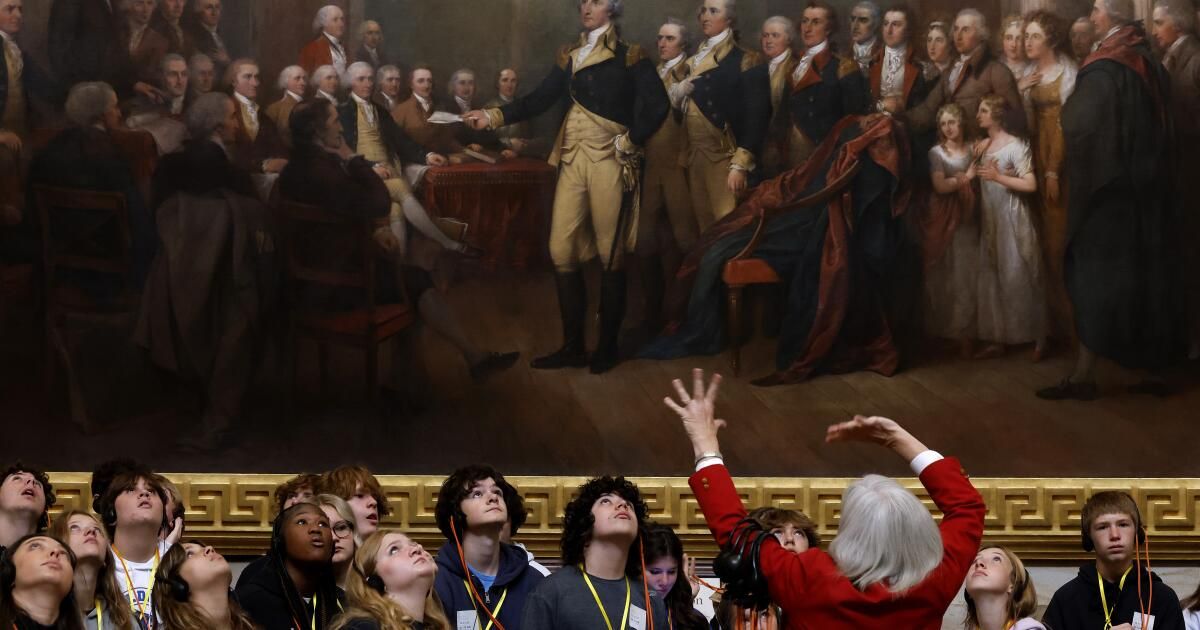George Washington was quite a man.
Life handed him the keys to this new country and instead of holding on to the wheel until his last breath, he stopped and let someone else drive.
It was this peaceful transfer of power that made America exceptional and Washington the defining figure of American masculinity. Even after the American Revolution, the dominant model of government throughout the world was inheritance. Kings begat kings and power was passed down like grandpa's cabin in the woods. For centuries, rulers ruled not by proven character but by accidental birth.
And the founders hated it.
Read Thomas Paine's 250-year-old essay, “Common Sense,” and you will see that few things bothered colonial men more than servitude to geopolitical nepo-babies. It is evident in the writings and personal libraries of our early presidents, such as Thomas Jefferson. You can trace that sentiment back to the Greek philosophers the founders studied before this nation began.
His aversion was not towards wealth and power. It was about what can happen to a person who grows up knowing nothing but wealth and power.
“Men who consider themselves born to reign, and others to obey, soon become insolent,” Paine wrote in 1776. “Selected from the rest of mankind, their minds are soon poisoned by importance; and the world in which they act differs so materially from the world at large, that they have little opportunity of knowing their true interests, and when they succeed in government they are frequently the most ignorant and inadequate of all domains.”
In some ways, Paine's summary is the original diagnosis of toxic masculinity. Inherited wealth and political power were seen as traits that made men susceptible to corruption and weak-mindedness due to lack of civic duty. Aristotle believed that without a sense of civic duty, concepts like “virtue” and “concern for others” were difficult for a person to understand. The successors to much of that ancient Greek thought, including Washington and Jefferson, defined manhood not by surrendering to individual impulses but by mastering them.
Therefore, although the men who fought for freedom and founded this nation were not perfect or blameless, Donald Trump should never be compared to them.
He was a millionaire at 8 years old; accused of (or personally bragged about) cheating on his three wives; and he lived through five wars without serving in any of them. Judging by Paine's own words, men like Trump represent what this country was fighting against, not what men in America should be.
There have been no better examples of this than his actions throughout this week.
First: When Bloomberg News correspondent Catherine Lucey asked Trump a question he didn't like, the most powerful man in the world pointed an angry finger at her and said, “Shut up, little pig.” He probably didn't like the question because it related to his administration's handling of Jeffrey Epstein's files. Every time that name is mentioned, voters are reminded that he and Epstein (a financier, convicted sex trafficker and pedophile) partied together for years. The House recently released a collection of emails related to Epstein that mention the president's name multiple times. In response, he ordered an investigation into his political rivals.
Second: When some Democratic lawmakers—including Sen. Elissa Slotkin, who served three terms in Iraq, and Sen. Mark Kelly, who was a Navy pilot in the first Gulf War—released a video urging U.S. troops to honor their oaths and reject illegal orders, Trump said the members of Congress' words were “punishable by death.”
“Our laws are clear,” the group said in the video. “No one has to execute orders that violate the law or our Constitution.”
The president called his message “SEDITIOUS BEHAVIOR” in an online post and shared another user’s post that said “HANG GEORGE WASHINGTON!!”
Hence the need to remind them what kind of man Washington was or, as we would say now, what kind of adult.
The reason Trump reacted so vehemently when lawmakers reminded members of the military to respect the law is because “men who consider themselves born to reign and others to obey, soon become insolent.” When Paine wrote that 250 years ago, it resonated with people because they had witnessed it. They were living it. That's why the founders defined American masculinity as the antithesis of all that.
Today we are having a cultural conversation about masculinity. Some misguided fools on a microphone point the finger at career women as the reason men are struggling.
I say we are struggling because many of us still see Trump's behavior and rhetoric as good examples. We have forgotten that the forefathers wanted civic duty – not impulsive insults and lawlessness – to be the hallmark of American virtue. It was not Washington's use of military power that separated him (us) from others; It was the power he showed in moderation.
YouTube: @LZGrandersonShow










